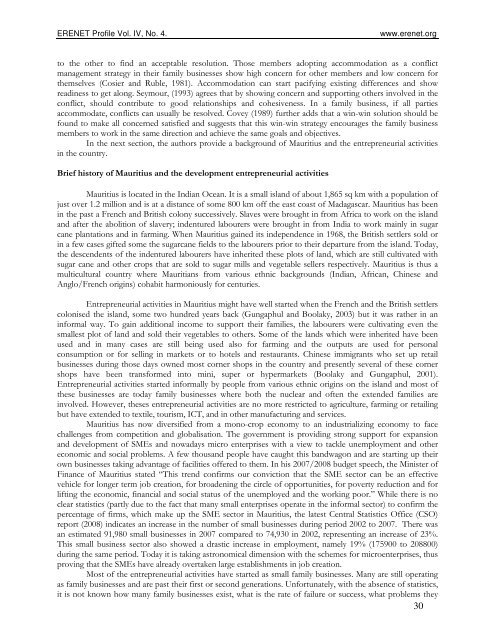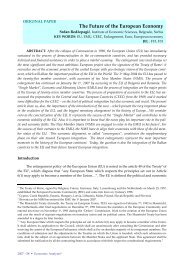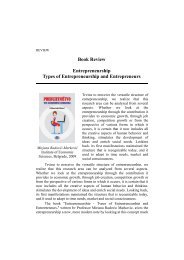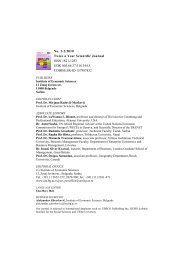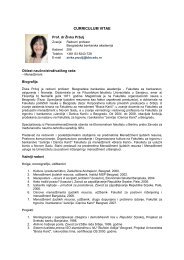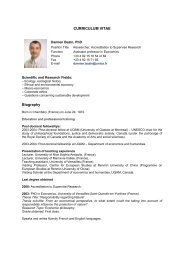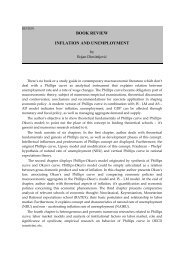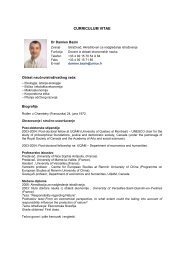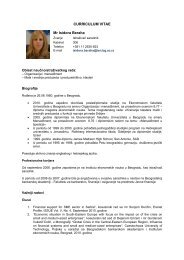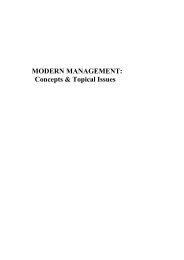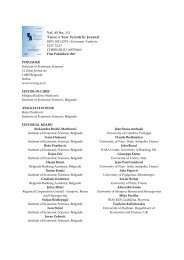Issue 16
Issue 16
Issue 16
Create successful ePaper yourself
Turn your PDF publications into a flip-book with our unique Google optimized e-Paper software.
ERENET Profile Vol. IV, No. 4.<br />
www.erenet.org<br />
to the other to find an acceptable resolution. Those members adopting accommodation as a conflict<br />
management strategy in their family businesses show high concern for other members and low concern for<br />
themselves (Cosier and Ruble, 1981). Accommodation can start pacifying existing differences and show<br />
readiness to get along. Seymour, (1993) agrees that by showing concern and supporting others involved in the<br />
conflict, should contribute to good relationships and cohesiveness. In a family business, if all parties<br />
accommodate, conflicts can usually be resolved. Covey (1989) further adds that a win-win solution should be<br />
found to make all concerned satisfied and suggests that this win-win strategy encourages the family business<br />
members to work in the same direction and achieve the same goals and objectives.<br />
In the next section, the authors provide a background of Mauritius and the entrepreneurial activities<br />
in the country.<br />
Brief history of Mauritius and the development entrepreneurial activities<br />
Mauritius is located in the Indian Ocean. It is a small island of about 1,865 sq km with a population of<br />
just over 1.2 million and is at a distance of some 800 km off the east coast of Madagascar. Mauritius has been<br />
in the past a French and British colony successively. Slaves were brought in from Africa to work on the island<br />
and after the abolition of slavery; indentured labourers were brought in from India to work mainly in sugar<br />
cane plantations and in farming. When Mauritius gained its independence in 1968, the British settlers sold or<br />
in a few cases gifted some the sugarcane fields to the labourers prior to their departure from the island. Today,<br />
the descendents of the indentured labourers have inherited these plots of land, which are still cultivated with<br />
sugar cane and other crops that are sold to sugar mills and vegetable sellers respectively. Mauritius is thus a<br />
multicultural country where Mauritians from various ethnic backgrounds (Indian, African, Chinese and<br />
Anglo/French origins) cohabit harmoniously for centuries.<br />
Entrepreneurial activities in Mauritius might have well started when the French and the British settlers<br />
colonised the island, some two hundred years back (Gungaphul and Boolaky, 2003) but it was rather in an<br />
informal way. To gain additional income to support their families, the labourers were cultivating even the<br />
smallest plot of land and sold their vegetables to others. Some of the lands which were inherited have been<br />
used and in many cases are still being used also for farming and the outputs are used for personal<br />
consumption or for selling in markets or to hotels and restaurants. Chinese immigrants who set up retail<br />
businesses during those days owned most corner shops in the country and presently several of these corner<br />
shops have been transformed into mini, super or hypermarkets (Boolaky and Gungaphul, 2001).<br />
Entrepreneurial activities started informally by people from various ethnic origins on the island and most of<br />
these businesses are today family businesses where both the nuclear and often the extended families are<br />
involved. However, theses entrepreneurial activities are no more restricted to agriculture, farming or retailing<br />
but have extended to textile, tourism, ICT, and in other manufacturing and services.<br />
Mauritius has now diversified from a mono-crop economy to an industrializing economy to face<br />
challenges from competition and globalisation. The government is providing strong support for expansion<br />
and development of SMEs and nowadays micro enterprises with a view to tackle unemployment and other<br />
economic and social problems. A few thousand people have caught this bandwagon and are starting up their<br />
own businesses taking advantage of facilities offered to them. In his 2007/2008 budget speech, the Minister of<br />
Finance of Mauritius stated “This trend confirms our conviction that the SME sector can be an effective<br />
vehicle for longer term job creation, for broadening the circle of opportunities, for poverty reduction and for<br />
lifting the economic, financial and social status of the unemployed and the working poor.” While there is no<br />
clear statistics (partly due to the fact that many small enterprises operate in the informal sector) to confirm the<br />
percentage of firms, which make up the SME sector in Mauritius, the latest Central Statistics Office (CSO)<br />
report (2008) indicates an increase in the number of small businesses during period 2002 to 2007. There was<br />
an estimated 91,980 small businesses in 2007 compared to 74,930 in 2002, representing an increase of 23%.<br />
This small business sector also showed a drastic increase in employment, namely 19% (175900 to 208800)<br />
during the same period. Today it is taking astronomical dimension with the schemes for microenterprises, thus<br />
proving that the SMEs have already overtaken large establishments in job creation.<br />
Most of the entrepreneurial activities have started as small family businesses. Many are still operating<br />
as family businesses and are past their first or second generations. Unfortunately, with the absence of statistics,<br />
it is not known how many family businesses exist, what is the rate of failure or success, what problems they<br />
30


